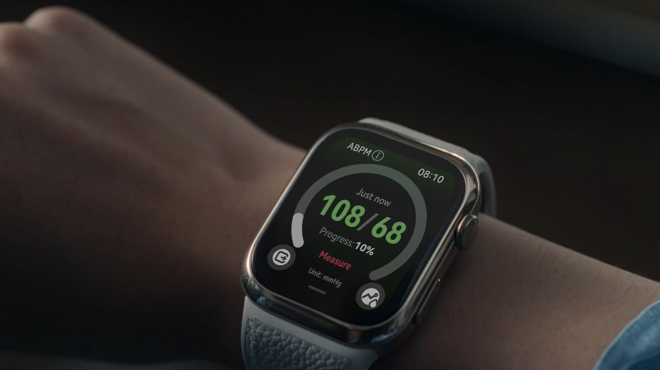- Change theme
Can Blood Pressure Monitors Help Detect Health Issues Early?

Discover how regular use of blood pressure monitors can aid in the early detection of health issues, including hypertension and cardiovascular disease
17:06 03 December 2024
Regular use of blood pressure monitor watchs has become an essential part of health and wellness. Monitoring blood pressure can reveal early signs of conditions like hypertension and cardiovascular diseases, enabling timely intervention and management. Devices like the HUAWEI WATCH D2 combine accuracy and convenience, empowering individuals to stay informed and proactive about their health.
The Role of Blood Pressure Monitoring in Early Detection
Understanding Blood Pressure Readings
Blood pressure readings consist of two values: systolic (SBP) and diastolic (DBP). Systolic pressure measures the force your heart exerts on arteries when it beats, while diastolic pressure reflects the force when the heart rests between beats. Regular monitoring helps track these values over time, identifying patterns or anomalies that could indicate health risks. Sudden spikes or persistent changes in these readings may serve as warning signs for conditions such as hypertension or hypotension. Early identification of these trends can help prevent more serious complications.
Identifying Hypertension and Hypotension
Abnormal blood pressure levels can signal underlying health issues. Hypertension, or high blood pressure, often shows no symptoms but can lead to heart attacks, strokes, and other severe complications. Conversely, hypotension, or low blood pressure, may cause dizziness, fainting, and fatigue, potentially indicating issues like cardiac dysfunction or hormonal imbalances. By regularly monitoring blood pressure, individuals can detect these conditions early and take preventive measures such as lifestyle changes or seeking medical advice. Blood pressure monitors with advanced features, like real-time trend analysis, are especially valuable for identifying these risks.
Health Conditions Linked to Abnormal Blood Pressure
Cardiovascular Diseases
High blood pressure places significant strain on the heart and blood vessels, increasing the risk of cardiovascular diseases. Chronic hypertension can lead to complications such as heart attacks, strokes, or heart failure. Regular monitoring provides crucial insights, enabling early detection and preventive care to reduce these risks. Smart blood pressure monitors, like the HUAWEI WATCH D2, deliver detailed blood pressure trends and averages, giving users the tools they need to take timely action. These insights can prompt medical evaluations, lifestyle adjustments, or treatment plans to mitigate cardiovascular risks.
Kidney Disorders
The kidneys play a key role in regulating blood pressure by managing fluid and salt levels. High blood pressure can damage the blood vessels in the kidneys, leading to impaired function and chronic kidney disease. Early detection of rising blood pressure levels allows individuals to seek interventions that protect kidney health. Smart blood pressure monitors can flag abnormal readings that might indicate potential kidney issues. Consistent monitoring and data tracking ensure users stay aware of their cardiovascular and renal health, prompting timely visits to healthcare providers.
Benefits of Regular Blood Pressure Monitoring
Early Intervention and Management
Regular blood pressure monitoring provides critical insights that enable early intervention. Detecting abnormal patterns before they escalate into more severe conditions can significantly improve outcomes. Devices like the HUAWEI WATCH D2 provide detailed reports, helping users recognize trends and seek medical advice proactively. Monitoring also aids in managing existing conditions. For instance, individuals diagnosed with hypertension can use regular measurements to track the effectiveness of medications or lifestyle changes. This ongoing feedback helps refine treatment plans and ensures better health outcomes.
Empowering Patients Through Self-Monitoring
Blood pressure monitors empower individuals by offering real-time data about their health. This self-monitoring capability fosters awareness, encouraging proactive health management. With regular readings, users gain a better understanding of their bodies and can identify factors that influence blood pressure, such as stress, diet, or exercise. Devices with app integration enhance this empowerment by providing detailed analysis, reminders, and alerts. Users can set goals, track progress, and even share data with healthcare providers, ensuring a collaborative approach to health management.
How to Effectively Use a Blood Pressure Monitor at Home
Using a blood pressure monitor effectively involves following best practices to ensure accurate readings. Begin by selecting the correct cuff size, as an improper fit can affect accuracy. Sit in a quiet place with your arm at heart level, and avoid caffeine, smoking, or physical activity 30 minutes before measuring. Take multiple readings at consistent times each day to track trends accurately. Smart monitors, like the HUAWEI WATCH D2, offer features such as reminders and automated measurement intervals, making regular monitoring convenient and effective. Adhering to these guidelines ensures you gain the most accurate insights from your device.
Conclusion
Blood pressure monitors are essential tools for detecting and managing health issues early. By tracking trends and identifying abnormalities, these devices help users take control of their health and prevent severe complications. Advanced monitors like the HUAWEI WATCH D2 provide real-time insights, empowering individuals to make informed decisions and seek timely medical intervention. Regular blood pressure monitoring is not just a preventive measure—it’s a proactive step toward better health and wellness. Start your journey to improved health by integrating a smart blood pressure monitor into your daily routine.
